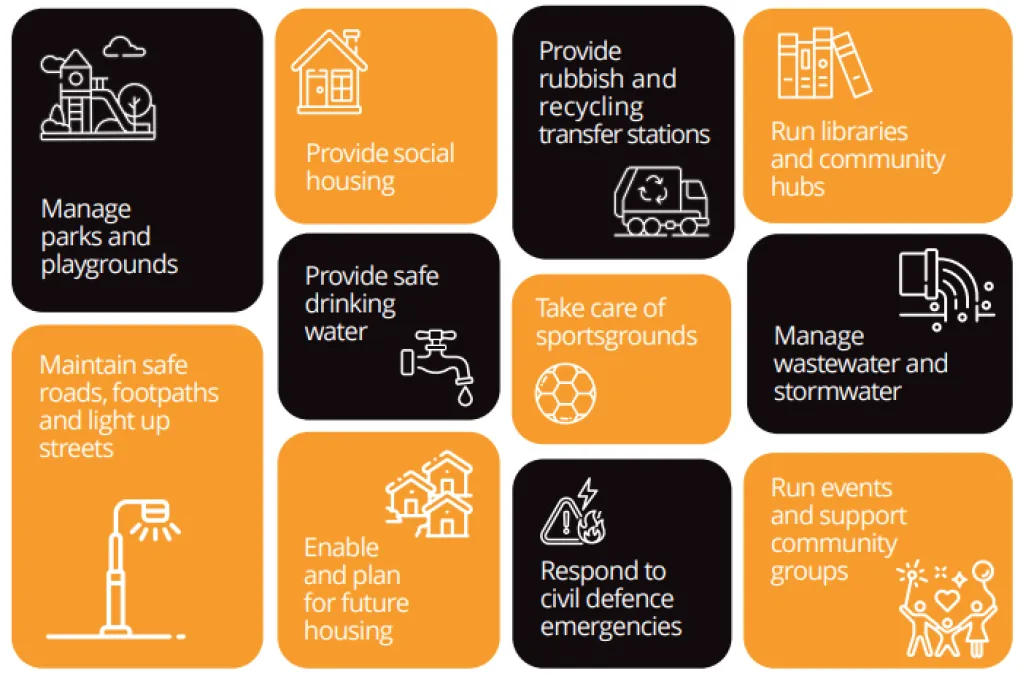How does council work?
Local government allows communities make democratic decisions for their towns, cities and regions, and for the people that live there. The LGA 2002 (s.13) provides councils a broad purpose, which is to:
- Enable democratic local decision-making and action by, and on behalf of, communities
- To promote the social, economic, environmental, and cultural well-being of communities in the present and for the future.
The purpose has two parts. The first part enables councils to make decisions and undertake services that their communities want and are prepared to pay for. The second part requires councils to think about the needs of future generations when making decisions regarding local services, infrastructure and regulations.
What do our Council do?
Rangitīkei District Council is responsible for providing the following:

Ensuring that councils provide the above for their communities in a cost-effective way is always a challenge. Costs for building new infrastructure and operating services have increased year on year, and people have differing views on what should and shouldn’t be prioritised.
How councils are funded
Councils’ primary source of funding comes from rates. Rates make up around 60 per cent of all operational expenditure, although this will vary from council to council. Remaining revenue comes from user charges, investment income, regulatory fees and roading subsidies. Councils are required by law to balance their budgets, unless it is prudent not to do so, and borrowing is undertaken to fund capital expenditure.
Councils are required to think of the inter-generational benefits arising from their activities and borrowing to fund assets that have a long life is a prudent way of sharing the cost of long life assets over succeeding generations that will benefit from the investment. Most councils borrow from the Local Government Funding Agency, which raises bonds and is able to lend to councils at lower interest rates than those charged by the banking sector.
The critical planning document is the Long Term Plan (LTP). The LTP is reviewed every three years, includes a 10-year financial strategy and a 30-year infrastructure strategy.
How council operates
Councils are separated into governance and staff.
- Governance. This is where elected members such as the mayor and councillors (the ‘council’), community board trustees, committee members etc sit. The primary purpose of the governance function is to make decisions on behalf of, and advocate for the needs and wants of communities. Council also determines the strategic direction of the council – i.e. how and which projects/initiatives council staff will priortise.
- Operations. This is where council staff (often referred to as ‘council officers’) sit. The primary purpose of the operations function is to carry out the day-to-day operations of council based on the strategic direction set by Governance.
Elected members only appoint one council staff position, the Chief Executive. The Chief Executive is tasked with employing all remaining staff to work on behalf of the council - and manages the performance of those staff. Each council negotiates an annual performance agreement with their Chief Executive to ensure alignment between Governance and Operations.
Making decisions
When it comes to decisions making, staff will collect most of the data, information and evidence needed by the governance team to make informed decisions that will impact on the community. Sometimes they’ll put forward recommendations to the governance team based on expert advice, and it’s up to the governance team to accept those recommendations, or go with other options put forward, or not go with any of the options at all and ask staff to do some more work on other options.
There are some decisions that can be made by staff who have delegated authority to do so, which is a way of managing the workload of the governance team and ensure efficiency of delivery for the community.As an elected member you will be responsible for making decisions involving very large amounts of public money, including debt. New Zealand councils spend more than $8 billion annually, so it’s important that decisions are based on accurate information and good advice. Elected members need to ask the right questions to ensure resources are used well and wisely.The way in which councils make decisions is subject to several rules and regulations set out in the LGA 2002 and other statutes. Some critical ones are:
- Decision-makers must be informed by the views of those affected by the decision
- Decision-makers must consider reasonable practicable options
- Decisions must be made in public unless there are specific grounds for excluding the public
- Decision-making processes must acknowledge the diverse needs of the community
Individual elected members have little authority by themselves. It’s only when acting together with your colleagues that you can implement policies and make a difference. To be effective you need to work constructively with your fellow elected members to gain their support.
Being transparent
Local government works well because it is open and transparent. This is one of the fundamental values of good government and both the Local Government Official Information Act 1987 (LGOIMA) and the Ombudsmen Act 1975 apply to councils. This means that all business, except when matters of personal or commercial sensitivity are concerned, must be conducted in public. It also means that all information, including information held by elected members in their council role, is also public information.
The public is entitled to attend hui of councils, committees, local boards and community boards, except where the hui has gone into public excluded. Members can elect to hold workshops to debate and find out more about an issue and these are often held without the public being present. However, decisions can’t be made at workshops.
